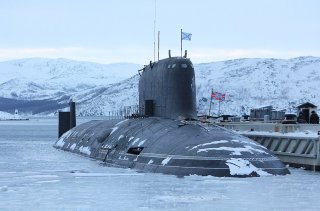Bad News: Russia Wants More Yasen-class Cruise Missile Submarines
The first Yasen-M boat, Kazan, was commissioned by Russia’s Northern Fleet earlier this year.
Russia’s defense industry is forging ahead with the construction of its new Yasen-class cruise missile submarines.
Russian deputy prime minister Yuri Borisov was asked about the status of the Yasen-class submarine line at a recent meeting of the ruling United Russia party. “Yes, of course, they will be built, we cannot do without them,” Borisov said.
The Yasen-class, also known as Project 885, is Russia’s newest line of nuclear-powered cruise missile submarines. The flagship Yasen vessel, K-560 Severodvisnk, was laid down as early as 1993. But construction progress on the K-560 sputtered in the aftermath of the Soviet collapse, with severe budget shortfalls forcing the project into cyclical delays. By the time that a newly modernizing Russian Navy marshaled the resources necessary to relaunch the project, large swathes of the submarine’s electronics, armaments, and other components were outdated or verging on obsolescence. Russia’s military decided to refresh the Yasen-class under the Yasen-M, or Project 885M, designation, overhauling large swathes of the submarine’s equipment to account for the sixteen-year gap between Severodvisnk and the second Yasen submarine, Kazan.
Displacing at just under fourteen thousand tons submerged and capable of traveling at a maximum speed of thirty-five knots, the Yasen line is reportedly powered by a new, next-generation reactor that offers a service life of up to three decades and produces exponentially less noise than its Soviet predecessors. The Yasen M-class is set to considerably narrow, but not entirely close, the Cold War-era stealth gap that has persisted for decades between U.S. and Soviet submarines.
In an analysis published by Naval News, noted submarine expert H I Sutton offered an in-depth technical comparison between the Yasen-class and its closest competitor, the U.S. Navy’s Virginia-class attack submarines. Although the two boats are broadly similar in their basic engineering principles, Sutton noted that the Yasen-class are designated as cruise missile submarines and are thus designed around a somewhat different set of capabilities than their lighter and slightly smaller Virginia counterparts. The Yasen-class offers a higher overall missile capacity of seventy-two—split between the modern 3M14K Kalibr subsonic missile and P-800 Oniks supersonic missile—against them missile payload of the Block V Virginia-class submarines, which is sixty-six.
Sutton added that the Yasen-class submarines are likely to receive the vaunted upgrade to hypersonic cruise missiles sooner than the Virginia line. Russia’s 3M22 Tsirkon is a winged anti-ship hypersonic cruise missile that was tested on Severodvinsk and is widely expected to be compatible with future Yasen-M models, in addition to many of the Russian Navy’s modernized surface vessels. Tsirkon is reportedly capable of hitting targets at a speed of over Mach 8 and will boast a range of around one thousand to fifteen hundred kilometers depending on whether it is engaging ground or naval targets. It was likewise reported that certain Yasen-M boats will support the upcoming Kalibr-M missile, a larger, hypersonic Kalibr variant with a range of around forty-five hundred kilometers.
The first Yasen-M boat, Kazan, was commissioned by Russia’s Northern Fleet earlier this year. Seven more Yasen class submarines have been laid down and are in various stages of construction, with the upcoming K-573 Novosibirsk scheduled to be handed over to the Pacific Fleet by the end of 2021.
Mark Episkopos is a national security reporter for the National Interest.
Image: Wikimedia Commons

